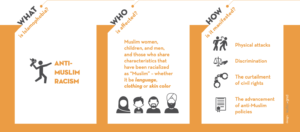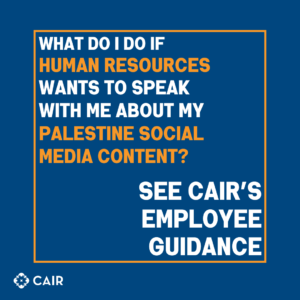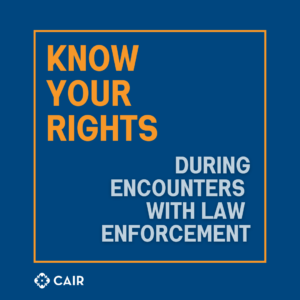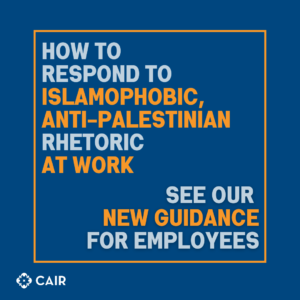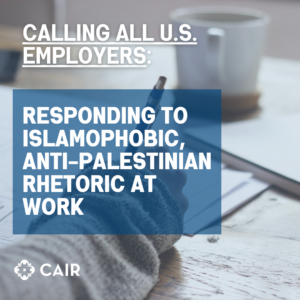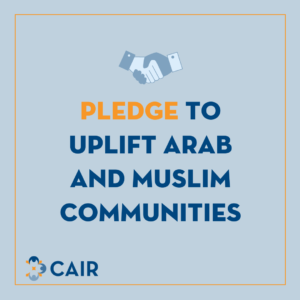Unchallenged, Islamophobia will continue to increase. For this guide, we direct our recommendations to the Muslim community in the United States.
Recommendations to American Muslim Individuals
Be an example of the Islamic traditions of patience and reason
Muslims should avoid responses that play into the agendas of those seeking to smear our faith.
“The best thing I could always suggest to an individual is to act by example. Their example must be one that is calm and collected. Reflect the teachings of Prophet Mohammad—even in the face of his greatest enemies and critics and people who threw garbage on him, he treated people with the utmost respect and dignity,” said Asad Ba-Yunus.
God states in the Quran: “(But whatever they may say or do,) repel the evil (that they commit) with something that is better: We are fully aware of what they attribute (to Us).” (The Holy Quran, 23:96)
And also: “(Since) good and evil cannot be equal, repel (the evil deed) with one that is better. Then you will see that he with whom you had enmity, will become your close friend.” (The Holy Quran, 41:34)
A Christian leader offered this observation during an interview for CAIR’s Same Hate, New Target report:
“I think there is the double burden that American Muslims have of both having to explain and convey their faith to a group of people who are non-Muslim who may be asking very ignorant and silly questions but nonetheless ones that are genuine. I think having an enormous amount of patience with non-Muslims is not necessarily a fair thing, but nonetheless an important thing. Trying hard to explain their faith as much as they possibly can without going crazy but also having patience and understanding with non-Muslims who perhaps should have a better understanding but actually don’t, and I think that’s an incredibly, incredibly important thing.”
Be an open neighbor
“I do not think that we as individuals have been forthright in being able to express our values,” said Haris Tarin, former Washington D.C. office director for MPAC. “We have just taken for granted the fact that our fellow citizens are good people. They know me, so they do not need to know my values and my principles and my religion. I think that has got to change. I think the average individual to a certain extent needs to engage in conversations that humanize Muslims, humanize Islam. Because that is the way you defeat Islamophobia on the ground.”
CAIR’s research supports this assertion.
Additionally, a Gallup study indicated that, “personal affiliation with a Muslim may help to soften extreme prejudice, but is not enough to eliminate it.” Gallup adds, “One’s perception of the faith is as strongly associated with tolerance, as is one’s perception of the characteristics of the faith group in general. Those who associate attributes such as gender issues, peace, and interfaith acceptance with Muslims are more likely to claim no prejudice against the faith group.” [i]
Suggestions:
- Introduce yourself to your neighbors of all faiths, races and ethnicities. Take them food or other small gifts on Islamic holidays or on their holidays. Invite them to social occasions you host in your home. We recommend discussing the issue of religion if and when it comes up naturally, whether that is to explain a dietary or other religious observation or as part of a broader discussion of beliefs.
- Repeatedly speak out in a clear and thoughtful manner condemning any form of bigotry.
Be active in community life
- Get involved in your neighborhood watch or community association.
- Pioneer or join a community clean-up or other neighborhood improvement events.
- Join your children’s school’s Parent Teacher Association (PTA) or other community organization.
- Put together a Ramadan or Hajj display at a local organization, school or library.
- Donate books, DVDs and other materials about Islam to your local public and school libraries.
- Join or start a local CAIR chapter.
- Submit an opinion piece to your newspaper about an issue of local importance.
Be active in political life
- Attend school board meetings and city council meetings.
- Make sure you register to vote and cast your ballot in local, state and national elections.
- Volunteer to campaign for a candidate you feel reflects your values.
- Contribute to candidates for political office.
- Run for elected office.
- Write, call or e-mail the elected officials who represent you in congress about issues that are important to you.
- Orient your children toward public service, law, political science, and media-related fields.
- Create Muslims professional associations and neighborhood organizations whose aim is to serve all members of your local community, e.g. free clinics, supporting little leagues and pee wee leagues (which are drying up due to lack of funding), homeless shelters, soup kitchens, etc.
- Create blogs and websites that put the Muslim-haters on the defensive.
Document and report acts of Islamophobia and anti-Muslim discrimination
Report such incidents to the appropriate authorities. Both Human Rights First and the Leadership Conference on Civil and Human Rights note that hate crimes are underreported in the United States.[ii] This matches CAIR’s experience.
We understand that reporting an incident is often that last thing a person wants to do, but it is the best thing for ensuring justice and protecting others from experiencing similar incidents.
Perpetrators of discrimination cannot be allowed to think their crime carries no consequences. The public must see and share the natural revulsion that accompanies hearing and seeing the results of bigotry.
Documentation is important. Take pictures of vandalism; record bigoted speech when you see it on TV.
To report an Islamophobic act or an incident of anti-Muslim discrimination, call CAIR at (202) 488-8787 or go here.
Confront Islamophobia in the news and entertainment media
- Document
- Note the date and time, channel or program, and the person who made the Islamophobic comments. (Was it the host or a guest?)
- Try to obtain a transcript, podcast or recording of the incident.
- Write down the advertisers whose ads aired during the program.
- If you are tracking a pattern of Islamophobic discourse, begin recording the program every time it airs.
- Report it to CAIR
- To help us respond effectively, include as much of the above documentation as possible.
- Act
- Contact the editor, station manager, or other official from the media outlet to express your concerns. Always be polite, but clear and assertive. See “Writing a Letter to the Editor” below.
- Organize a coalition to arrange a community meeting with the outlet’s management.
- Contact CAIR to obtain copies of “American Muslims: A Journalist’s Guide to Understanding Islam and Muslims” and distribute them to local media.
- If these meetings do not yield a satisfactory result, consider launching an advertiser campaign. Contact CAIR for more detailed guidance on this step.
Write a letter to the editor
To increase your chances of publication, follow these guidelines:
- React quickly to the news of the day, negative coverage or views you support. If possible, have the letter in the hands of an editor on the same day.
- Check online letter submission guidelines for that particular publication.
- Address the letter to the media outlet’s opinion editor.
- Keep your letter to no more than 150 to 250 words.
- State the purpose of the letter in 25 words or less.
- Pick one main topic and focus only on that one issue.
- Be authoritative. If possible, speak on behalf of a local organization in which you are involved.
- Give background information on the issue or misconception. Cite impartial and objective sources.
- Offer a reasonable and fair solution to the problem you are addressing in your letter.
- Be passionate or even controversial, but avoid rhetoric and defamation.
Address Islamophobia on the Internet
- Leverage social media (i.e. Facebook, Twitter) to network and promote a positive and accurate image of Islam and Muslims.
- One easy method is to re-post items distributed by CAIR. To join CAIR’s e-mail list, go to www.cair.com and enter your email in the “Subscribe” box on the right side of the page.
- Use your talent to start a blog to increase knowledge and familiarity with Islam and Muslims.
- Produce short educational videos and post them on YouTube.
- Responding to insulting chain e-mails or online comments with accurate and balanced information about Islam can help stop the cycle of misinformation.
- Gauge the influence of the source of Islamophobia on the internet. Many obscure individuals or organizations are desperate to get the publicity a controversy would bring them. We should try not to give them more publicity than they can get on their own. In many such cases, the best response is not to react at all.
- If the Islamophobic content comes from an influential source, document it.
- Save the URL (Internet address) and note the date and time you accessed the Islamophobic content.
- Save a screen shot/print screen image of the Islamophobic content.
- Include as much information about the author and source as possible.
- Note the Internet service provider or website host.
- Report Islamophobic content from influential sources to CAIR.
Confront Islamophobia from public figures
- Document
- If you learn of Islamophobic comments made by a public official (elected or appointed official, candidate, school official, etc.), document the source, date and any other pertinent information.
- If you hear Islamophobic comments from public figures that are not recorded, write them down as soon as you can and ask others who may have heard them to write what they heard, or at least to act as witnesses to the comments.
- If allowed by law, record events such as town hall meetings or other public gatherings you attend.
- Report Islamophobic incidents or comments to CAIR.
- Organize a local letter-writing or call-in campaign to express community concerns to the person responsible for the Islamophobic statements. Submitting letters for publication in a local newspaper can help make your position known to a broader audience.
- Get involved. Consider joining or forming community coalitions to meet with your local, state and federal elected officials. While meetings may be a good response to Islamophobic comments by public officials, it is more effective to establish good relationships prior to an incident. If an elected official knows local Muslims, and has heard their concerns and felt their support, he or she is more likely to stand up for the Muslim community when another public figure makes a bigoted or ill-informed comment.
- Sponsor copies of the Quran to be sent to local public officials and opinion leaders. Visit: www.explorethequran.com.
Support local, regional and national Muslim organizations
“One thing individuals can do … is to participate in mosque life and to encourage the participation of the mosque and thejamaat in American life,” said Imam Talib Abdur Rashid during an interview for CAIR’s Same Hate, New Target report.
Unfortunately, many excellent local efforts are not fully capitalized on or integrated with larger national endeavors. Frequently, this is purely because the organizers are unaware of others’ activities. We recommend that individuals, local and regional groups form partnerships or consider signing a memorandum of understanding with a national organization to synergize their work, inshaAllah granting all better results.
Working with any of CAIR’s local chapters may serve to further your cause. Find the nearest CAIR chapter by visiting here.
Recommendations to American Muslim Institutions
Provide positive alternatives to Islamophobic events
- Organize events that provide a positive community outlet for concerns related to Islamophobia or other forms of intolerance. CAIR believes that the best response to an Islamophobic event is to offer a positive alternative.
- Form community groups that promote mutual understanding. This is best done before an incident occurs in the local community that requires a unified response.
Invest in community development
- Assist in the development of Muslim colleges that can produce graduates who think based on Islamic values and act in the American pluralistic and constitutional context.
Dr. Robert Crane echoes this suggestion: “Educate the younger generation with vision so that they can enter academia and help change entire paradigms of thought, or join and found think tanks in order to shape political agendas, or even prepare for a career in politics in order to work proactively from an interfaith perspective on specific policy issues unrelated to Muslims as a group or Islam as a religion.”[iii]
- Establish systematic and comprehensive programs to educate interested Americans about Islam in the form of classes in mosques based on a nationally established curriculum.
Re-introduce Islam
“There is a real set of opportunities for national Muslim organizations to really, so to speak, change the brand for Muslims in the United States. That is very hard to do,” Aziz Huq suggests. The goal he says is to “reconfigure people’s expectations about what it means to be a Muslim.”
“I do not think that we have been able to successfully put forth the counter narrative. Now the word ‘shariah’ is the new ‘jihad,’ which is being made over into a dirty word,” said Haris Tarin.
American Muslim institutions must change the dialogue from what Muslims are not (terrorists, extremists, here to remove the Constitution) to what we are.
Suggestions:
- Support, promote and encourage books, movies and art produced by objective people or by Muslims.
- Unite scholars and communications professionals to counter the narratives that misrepresent Islam, such as verses quoted out of context, mistreatment of women in Islam, co-opted terms such as ”jihad” and ”shariah.” Have them produce narratives that are accurate, easily understood and formatted for forums in which concise responses are required.
Begin to host Muslim achievers banquets
- Recognize local Muslims and display their work, both to encourage young people and also to allow your neighbors to see the good work Muslims are doing.
Expose the Islamophobes
- They are small in number and they do not represent the majority of the public; however, they can poison the general public by providing misinformation.
- In many instances, Muslim institutions are placed in situations where they must respond to material created by individuals and institutions. Institutions should unify efforts to expose the purposes and methods of funding of those who manufacture Islamophobia.
Promote volunteerism
Acting in the Islamic tradition of volunteerism should be a constant push from community leaders, not only during emergencies, but consistently encouraged during sermons and at other opportunities. Local institutions should offer their congregations or members regular opportunities to volunteer. We must better leverage the deep professional resources in finance, law, and medicine available in our community.
“I think we really need to serve the society,” said CAIR-National Executive Director Nihad Awad during a discussion about this report. “We need to do service beyond our immediate circles, beyond the traditional religious functions. I think that is when the community will find itself at home and when other people will find the community worthy of respect.”
Hold open houses
We recommend at least one open house per quarter for mosques and Islamic centers. The event need not specifically focus on Muslim topics. CAIR’s national headquarters hosted an open house during the 2009 presidential inauguration, offering attendees a place to recover from the January cold. Simply showing thoughtfulness and hospitality can change some people’s perceptions of Muslims.
Advertising is crucial to diversify the audience you are reaching. Many local radio and community newspapers offer an opportunity for free announcements of such community-building events. Ask the leadership of nearby churches and synagogues to announce your event to their congregants. Ask everyone to post your event announcement to their e-lists and Facebook.
Expand your event beyond a simple display of posters or ethnic food—host discussions on the issues of the day. Invite a spectrum of speakers.
Sponsor a CAIR “Know Your Rights and Responsibilities” workshop in your area
To schedule one for your community or company, please email [email protected] or call (202) 488-8787.
Empower your community through civic engagement
CAIR offers civic participation trainings for those who are interested in improving the impact of the ideas and efforts. To schedule a training in your community, call (202) 488-8787 or e-mail [email protected].
Download a copy of CAIR’s Civic Participation Handbook, a manual designed to help you roll up your sleeves and start impacting the public sector, here.
Continue and strengthen outreach to law enforcement
In a 2004 press statement, Dr. Asma Mobin-Uddin of CAIR-Ohio said: “We would like to help law enforcement officials and Muslims have an appreciation for each other’s needs and concerns. This way, we can improve understanding and cooperation between the groups.”
American Muslims strongly support law enforcement and the protection of our national security. As Americans, we also value the civil rights of all Americans. All Americans have the constitutional right of due process and to be politically active.
If you know of any criminal activity taking place in your community, it is both your religious and civic duty to immediately report such activity.
Ensure the safety and security of your institution
You can obtain a copy of CAIR’s “Best Practices for Mosque and Community Safety” handbook which has been developed to better equip you and your community with the knowledge necessary to protect against anti-Muslim bigotry or attacks, and to secure your basic legal rights.
Request your copy of “Best Practices for Mosque and Community Safety” here.
[i] Gallup. “Religious Perceptions in America: With an In-Depth Analysis of U.S. Attitudes Toward Muslims and Islam,” 2009.
[ii] Human Rights First, “Violence against Muslims: An Update to HRF’s 2008 Hate Crime Survey,” 2010.
[iii] Crane, Robert. “Institutionalized Contempt for Islam, How do we Tackle it?,” December 20, 2008 http://iqu.co.in/wordpress/?p=36
Anti-Islamophobia Reading List
War on Terror:
The Muslims Are Coming! Islamophobia, Extremism, and the Domestic War on Terror – by Arun Kundnani
Good Muslim, Bad Muslim: America, the Cold War, and the Roots of Terror – by Mahmood Mamdani
Innocent Until Proven Muslim: Islamophobia, the War on Terror, and the Muslim – by Maha Hilal
Don’t Forget Us Here: Lost and Found at Guantanamo – by Mansoor Adayfi
The Mauritanian – by Mohamedou Ould Slahi
American Islamophobia:
Islamophobia and the Politics of Empire – by Deepa Kumar
Orientalism – by Edward Said
Covering Islam – by Edward Said
American Islamophobia: Understanding the Roots and Rise of Fear – by Khaled Beydoun
